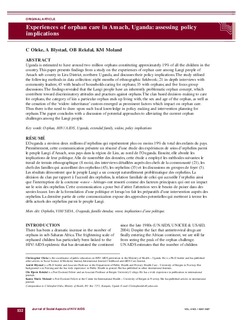Experiences of orphan care in Amach, Uganda: assessing policy implications
Journal article, Peer reviewed
Permanent lenke
http://hdl.handle.net/11250/2481842Utgivelsesdato
2007Metadata
Vis full innførselSamlinger
Originalversjon
Oleke, Christopher, Blystad, Astrid, Rekdal, Ole Bjørn, & Moland, Karen Marie. (2007). Experiences of orphan care in Amach, Uganda: assessing policy implications. Journal of Social Aspects of HIV/AIDS, 4(1), 532-543.Sammendrag
Uganda is estimated to have around two million orphans constituting approximately 19% of all the children in the country.This paper presents findings from a study on the experiences of orphan care among Langi people of Amach sub-county in Lira District, northern Uganda, and discusses their policy implications.The study utilised the following methods in data collection: eight months of ethnographic fieldwork; 21 in-depth interviews with community leaders; 45 with heads of households caring for orphans; 35 with orphans; and five focus group discussions.The findings revealed that the Langi people have an inherently problematic orphan concept, which contribute toward discriminatory attitudes and practices against orphans.The clan based decision-making to care for orphans, the category of kin a particular orphan ends up living with, the sex and age of the orphan, as well as the cessation of the ‘widow-inheritance’ custom emerged as prominent factors which impact on orphan care. Thus there is the need to draw upon such local knowledge in policy making and intervention planning for orphans.The paper concludes with a discussion of potential approaches to alleviating the current orphan challenges among the Langi people.
